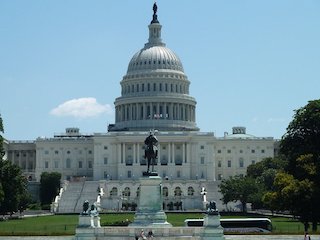A total of 30 House and Senate Democrats unveiled a $94 billion proposal Thursday to make broadband more accessible and affordable nationwide, aiming to remedy some of the digital inequalities that have kept millions of Americans offline during the coronavirus pandemic.
The new effort, chiefly written by House Majority Whip Rep. James Clyburn (D-SC) and Sen. Amy Klobuchar (D-MN), marks one of the most expensive and ambitious broadband packages proposed in recent years, according to The Washington Post. It aims to commit record-breaking sums to bring internet service to unserved areas, improve speeds and help low-income families.
Closing the persistent digital divide has long been counted among Democrats’ top policy priorities. But the issue has taken on new political urgency since the coronavirus left much of the country no choice but to rely on the internet to participate in daily life.
In the months ahead, Democrats believe they have a viable plan to advance their legislation, known as the Accessible, Affordable Internet for All Act. It would be part of the debate over infrastructure reform.
Congress is expected to turn to the matter after lawmakers Wednesday completed legislative work on a $1.9 trillion coronavirus stimulus package. That included $7-plus billion in broadband accessibility funds, Inside Towers reported. The bill, signed by President Biden on Thursday, also set aside an additional $10 billion in infrastructure spending that states can potentially put toward improving broadband within their borders.
“We’re not going to grow the economy in our communities all across the country without broadband,” Clyburn told the Post. “The investments we’re making in this, and the build-out over three to four years, makes this one of the best infrastructure efforts we can undertake today.”
At least 18 million Americans lacked reliable connectivity, federal regulators found in a report last year, cautioning at the time that the number might actually be higher. The problem is especially persistent in rural communities, where options for speedy internet service are limited, as well as urban areas and tribal lands, where low-income families, cannot afford web access.
The new bill gives preference to projects that help rural and tribal areas or those that provide better, cheaper internet to lower-income communities. The measure also sets aside an additional $6 billion to extend an affordability program authorized by Congress as part of a stimulus bill in December. That program is set to start paying up to $50 in monthly subsidies to families in financial need. Democrats’ new proposal essentially doubles the program’s pool of funds, according to the account.
Other elements of the bill seek to improve digital literacy, help students obtain wireless hotspots and bring more transparency to internet pricing, requiring the FCC to collect and make available more data on how much people are paying nationwide for internet access. Its regulatory reforms aim to make it easier for broadband providers to navigate the permitting process to lay fiber.
Democratic lawmakers sponsoring the new bill are bullish about their prospects. “We have the gavel,” Klobuchar said. “We will find a way to get this done.”





Reader Interactions